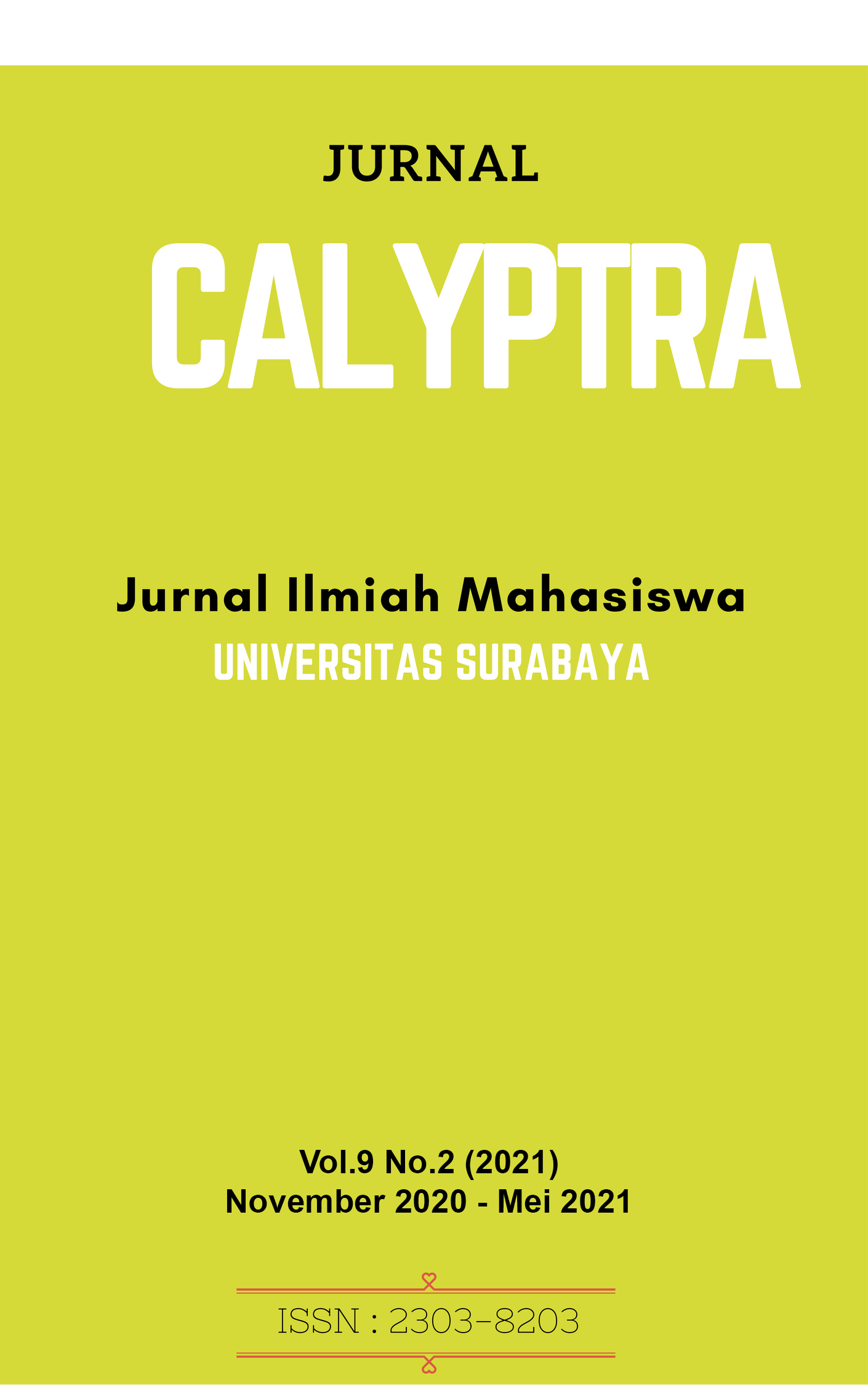STUDI LITERATUR: KONTRIBUSI ACCOUNTING MATTERS DALAM SUSTAINABLE DEVELOPMENT GOALS
 Abstract Views:
740 times
Abstract Views:
740 times
 PDF Downloads:
438 times
PDF Downloads:
438 times
Abstract
Abstract — This research will answer the following question: how do accounting support sustainable development goals (SDGs). In the process, this research used the method of literature study using sources from journals, reports and books. The results of this study indicate that accounting has considerable capacity in achieving SDGs, even accounting itself can contribute to each of the 5P dimensions (people, planet, prosperity, peace, and partnerships). The main dimensions of spirituality also play a large role in achieving sustainability balance.
Keywords: accounting contributions, sustainable development goals (SDGs), sustainable development, spirituality
Abstrak— Skripsi ini akan menjawab pertanyaan berikut: bagaimana kontribusi akuntansi dan pelaku akuntansi dalam mendukung sustainable development goals (SDGs). Dalam prosesnya, penelitian ini menggunakan metode studi literatur atau studi pustaka menggunakan sumber-sumber yang berasal dari jurnal-jurnal, laporan, dan buku. Hasil penelitian ini menunjukan bahwa akuntansi memiliki kemampuan yang cukup besar dalam pencapaian SDGs, bahkan akuntansi dan pelakunya dapat berkontribusi dalam setiap dimensi 5P (people, planet, prosperity, peace, dan partnerships). Dimensi- dimensi utama dalam spiritualitas juga berperan besar dalam pencapaian keseimbangan sustainability.
Kata kunci: kontribusi akuntansi dan pelakunya, sustainable development goals (SDGs), sustainable development, spiritualitas
Downloads
References
Advertorial. (2019, Agustus 21). tirto,id. Retrieved from Kebaikan Lingkungan, Kebaikan Perusahaan: https://tirto.id/kebaikan-lingkungan-kebaikan-perusahaan-egKQ
Amankwah-Amoah, J. (2015). Where will the Axe Fall?: an Integrative Framework for Understanding Attributions After a Business Failure. European Business Review, 409-429.
Anonymous. (2014). The Three Pillars of Sustainability. Retrieved from thwink.org: http://www.thwink.org/sustain/glossary/ThreePillarsOfSustainability.htm
Anonymous. (2014). The Three Pillars of Sustainability. Retrieved from thwink.org: http://www.thwink.org/sustain/glossary/ThreePillarsOfSustainability.htm
Anonymous. (2014, May 15). What Is Climate Change? Retrieved from NASA: https://www.nasa.gov/audience/forstudents/k-4/stories/nasa-knows/what-is-climate- change-k4.html
Anonymous. (n.d.). Climate Change. Retrieved from National Geographic: https://www.nationalgeographic.org/encyclopedia/climate-change/
Anonymous. (n.d.). Climate Change: How Do We Know? Retrieved from Global Climate Change: https://climate.nasa.gov/evidence/
Bebbington, J., & Larrinaga, C. (2014). Accounting and Sustainable Development: an Exploration. Accounting, Organizations and Society, 1-19.
Çalişkan, A. Ö. (2014). How accounting and accountants may contribute in sustainability? Social Responsibility Journal, 246-267.
de Vries, G. (2016, 6 28). Public Financial Management Blog. Retrieved from How National Audit Offices Can Support Implementation of the SDGs: https://blog- pfm.imf.org/pfmblog/2016/06/national-audit-offices-should-support-implementation-of- the-sdgs.html
Efferin, S. (2016). Sistem Pengendalian Manajemen Berbasis Spiritualitas. Jakarta: Yayasan Rumah Peneleh.
Frick, T. (2016). Designing for Sustainability: a Guide to Building Greener Digital Products.Sebastopol, USA: O’Reilly Media, Inc.
Goodland, R. (1995). The Concept of Environmental Sustainability. AnnualI Reviews Inc., 1-24. Gray,
R., & Laughlin, R. (2012). It was 20 Years Ago Today. Accounting, Auditing & Accountability Journal, 228-255.
Gunarathne, N., & Lee, K.-H. (2015). Environmental Management Accounting (EMA) for Environmental Management and Organizational Change: An Eco-Control Approach. Journal of Accounting & Organizational Change, 362-383.
International Federation of Accountants. (2016). The 2030 Agenda for Sustainable Development: a Snapshot of the Accountancy Profession’s Contribution. International Federation of Accountants.
International Integrated Reporting Council. (2016). GRI Sustainability Reporting Standards. Amsterdam: GRI Foundation.
Lehman, G., & Kuruppu, S. C. (2017). A framework for Social and Environmental Accounting Research. Accounting Forum, -.
Llewellyn, S., & Milne, M. (2007). Accounting as codified discourse. Accounting, Auditing & Accountability Journal, 805-824.
Mahipalan, M., & Sheena. (2018). Workplace Spirituality and Subjective Happiness Among Highschool Teachers: Gratitude as a Moderator. Explore, -.
Nathanson. (n.d). Water Pollution. Retrieved from WWF: https://wwf.panda.org/knowledge_hub/teacher_resources/webfieldtrips/water_pollution
NHS Estate. (2015). Sustainable Development: Environmental Strategy for the National Health Service. London: The Stationery Office.
Pelenc, J., Ballet, J., & Dedeurwaerdere, T. (2015). Weak Sustainability versus Strong Sustainability. Retrieved from Sustainable Development Goals Knowledge Platform: https://sustainabledevelopment.un.org/content/documents/6569122-Pelenc- Weak%20Sustainability%20versus%20Strong%20Sustainability.pdf
Petchsawang, P., & Duchon, D. (2009). Measuring Workplace Spirituality in an Asian Context.Human Resource Development International, 459-468.
Porter, M., & Kramer, M. (2002). The Competitive Advantage of Corporate Philantrophy. Harvard Business Review, 5-16.
PWC. (2018). From promise to reality: Does business really care about the SDGs? PWC.
Renko, S. (2018). The Concept of Sustainable Development. The Sustainable Marketing Concept in European SMEs, 29-52.
Samekto, C., & Winata, E. S. (2010). Potensi Sumber Daya Air di Indonesia. 1-20.
Schwab, L., Gold, S., Kunz, N., & Reiner, G. (2017). Sustainable Business Growth: Exploring Operations Decision-Making. Journal of Global Responsibility, 83-95.
Setthasakko, W. (2009). Barriers to Implementing Corporate Environmental Responsibility in Thailand: A Qualitative Approach. International Journal of Organizational Analysis, 169- 183.
Siboni, B., Sangiorgi, D., & Farneti, F. (2016). Gender (in) Accounting: Insights, Gaps and an Agenda for Future Research. Meditari Accountancy Research, -.
United Nations. (1987). Our Common Future. United Nations.
United Nations. (2015). Transforming our world: the 2030 Agenda for Sustainable Development.New York: United Nations.
United Nations Department of Economic and Social Affairs. (2014). World Urbanization Prospects. United Nations Publications.
Wijethilake, C., & Ekanayake, A. (2018). Proactive Strategic Responses to Corporate Sustainability Pressures: A Sustainability Control System Framework. Advances in Management Accounting, 129-173.

This work is licensed under a Creative Commons Attribution-ShareAlike 4.0 International License.
- Articles published in CALYPTRA are licensed under a Creative Commons Attribution-ShareAlike 4.0 International license. You are free to copy, transform, or redistribute articles for any lawful purpose in any medium, provided you give appropriate credit to the original author(s) and the journal, link to the license, indicate if changes were made, and redistribute any derivative work under the same license.
- Copyright on articles is retained by the respective author(s), without restrictions. A non-exclusive license is granted to CALYPTRA to publish the article and identify itself as its original publisher, along with the commercial right to include the article in a hardcopy issue for sale to libraries and individuals.
- By publishing in CALYPTRA, authors grant any third party the right to use their article to the extent provided by the Creative Commons Attribution-ShareAlike 4.0 International license.



